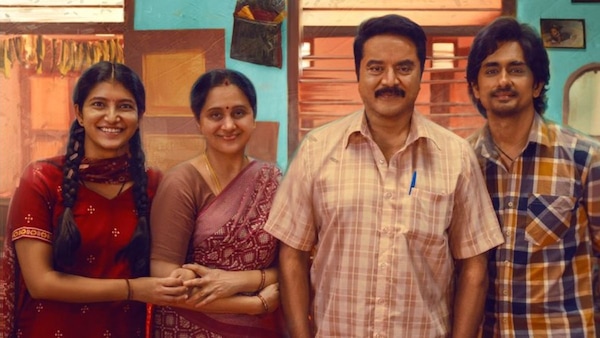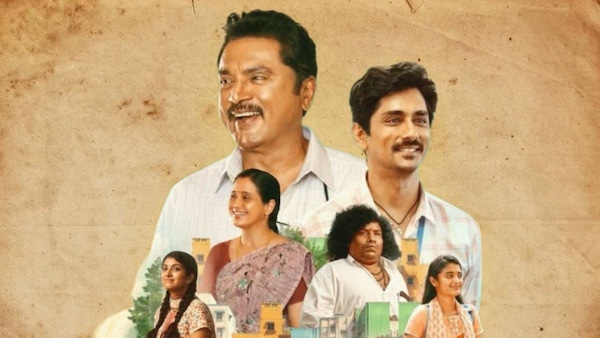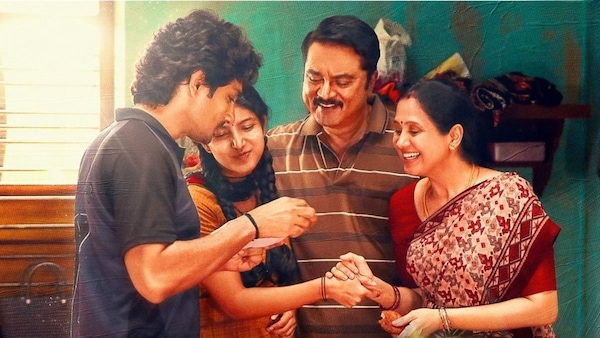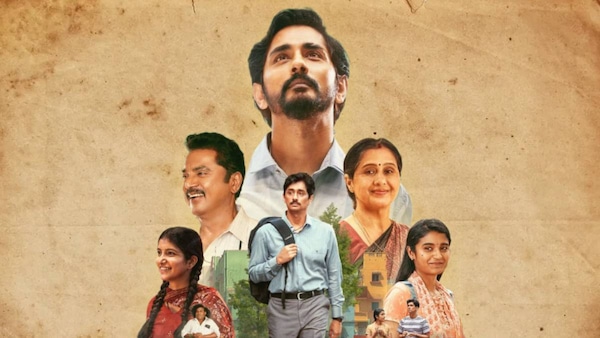3 BHK: Director Sri Ganesh Makes A Film That's Inauthentic To A Fault
3 BHK doesn’t let any scene or moment breathe. It is as if the film wants to work like a flowchart: this happened then that happened and now here we are. Aditya Shrikrishna writes.

Last Updated: 08.57 PM, Jul 04, 2025
OVER AN HOUR INTO 3 BHK, director Sri Ganesh stages a scene in a restaurant that is completely disconnected from the rest of the film. It occurs out of nowhere and sticks out like a stray limb out of a burning pyre. Prabhu (Siddharth) and his sister Aarthy (Meeta Raghunath) take their parents, Vasudevan (Sarath Kumar) and Shanthi (Devayani), to a fancy restaurant for their wedding anniversary. The restaurant is way out of their middle class means. As a flabbergasted Vasudevan looks at the menu and his surroundings, Prabhu turns to him and says “kaalam maari pochu (times have changed)”. It is a regular aphorism, but it is also the title of a popular 1996 film from the stables of V Sekar, the ‘90s kingpin of middle-class family dramas. Dramas that might be lowbrow on the surface but have a remarkable level of honesty and clarity. They shoot straight and are seldom disingenuous. That moment really clicked into place what is not working with 3 BHK, ostensibly a similar film but one that takes itself way too seriously and has very little authenticity to deserve our attention.

As the title suggests, the plot is straightforward. Vasudevan heads a modest, cookie cutter low-income family; he works as an accountant, his talent already outdated; and his wife sometimes moonlights with a home kitchen. All they want is a home of their own — three-bedroom, hall and kitchen. Their eldest is son Prabhu and the daughter is wise beyond her age. The problems with the film begin with its casting. The film wants its temporal realities to stretch an epic length; it goes from around 2005-06 to all the way till 2027. So, Siddharth goes to high school and pretends to have a nervous breakdown during the board exam. As young as Siddharth looks, playing a school kid is a bridge too far. And stars like Siddharth and Sarath Kumar bring a certain baggage with their veteran status that is hard to disengage in a film like this.
What Sri Ganesh, who has adapted Aravindh Sachidanandam’s short story into a feature script, wants here is for us to remember the Sarath Kumar and Devayani of Surya Vamsam (1997), the quietly determined couple who rise over their outcast status with hard work and dignity. Vasudevan and Shanthi are of similar stature though he doesn’t run a burgeoning business, and she is a housewife, not a future IAS officer. It already feels like a downgrade (Devayani has so little to do in this film that it is criminal) but the sense of constant struggle is what the film wants to underline. But 3 BHK’s look and feel, its staging and edit pattern, its houses and walls and offices look so artificial that it is impossible to get into the film and feel anything. Everyone plays dress up. Only Meeta Raghunath with her relatively fresh face and superlative performance keeps things believable. She is the sister who goes to government college so that the son can go to a better school. She is the sister who studies well but insists she’ll continue in the government school so that the family can save for a home. She is a mature and level headed person who sits down and plans long term. Such is the realness of Meeta Raghunath’s performance that she is in some K Balachander town while the others languish in a zip code in the outskirts.

3 BHK doesn’t let any scene or moment breathe. It is as if the film wants to work like a flowchart, this happened then that happened and now here we are. The film’s pace is off; scenes don’t last long enough for us to take in these characters. The characters aren’t given enough time or material to even develop. We don’t see these people when they are not talking about buying a house or facing an exam or job interview. We don’t see these people during their lighter moments. Moments like that would draw us into their inner lives. But 3 BHK wants to just hover like a drone above this family, capturing every sad little moment possible.
There is a nice correlation between the luddite sensibility of Vasudevan as he refuses to learn computers for his job, fears what he doesn’t know, and blindly believing in their future, forces his son into an engineering course in IT. But apart from rare moments like this we don’t really know these characters. The film thinks if it can create a believable setting or surroundings, everything will fall into place. The exposition is at times embarrassing. When Prabhu and his college friend Kalai (it is suggested that he comes from an oppressed caste, but the film does nothing with it) join a part time job so that they can pay their arrear exam fees, they talk about their “plan” while executing it, as if explaining to us why they are where they are. And we are supposed to feel as shocked as Vasudevan when he finds out that the house that was going for Rs 15 lakhs a few years ago is now 25 lakhs. Did the accountant forever in the real estate market just discover inflation and how unpredictable the business is?

3 BHK jumps years on a whim. We are suddenly in 2007, then in Prabhu’s third year of college, then Aarthy is getting married, and a few scenes later he is 30 already. Sri Ganesh wants us to stay with the idea of failure as life’s constant but there is very little imagination to go with it. It’s also why he wants the same actor to play the school kid as well as almost 40-year-old later in the film, but it is something that pulls the film down. In a middle-class household like Vasudevan’s, women play important roles and make alarming sacrifices even outside of all the reproductive labour. But 3 BHK refuses to highlight anything associated with Shanthi’s daily life. It is a glaring error for a film that wants us to focus on the family as a unit, one of several inauthentic portrayals.
At the end of the film, Prabhu laments that they kept running after that elusive future full of happiness, and forgot to live in the present. Something that is true of the film as well. 3 BHK is one dimensional to a fault, focusing on the lowlights of a middle-class family, leaping from one sad reality to another. We all have a lot to learn from V Sekar.
